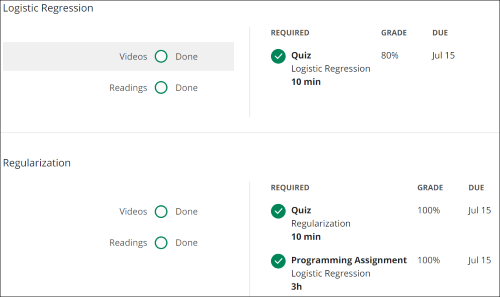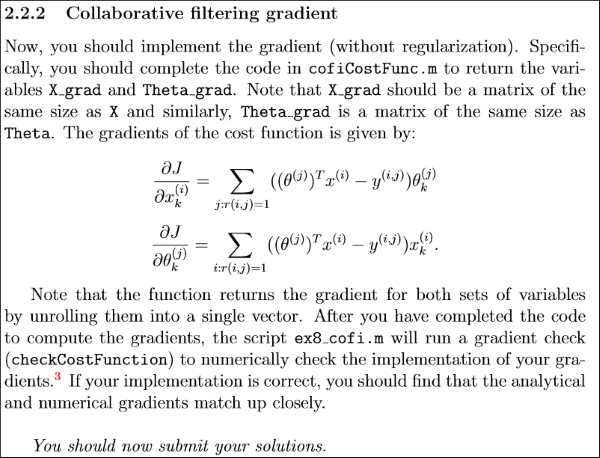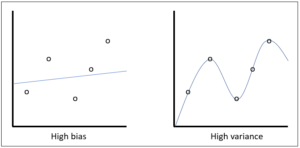Coursera machine learning course
| Joost Krapels |
Artificial Intelligence

The Coursera Machine Learning course by Stanford University is a great advanced course on Artificial Intelligence. If you are interested in becoming an AI expert, you fortunately do not need to pursue a bachelor, master, or PhD in AI to learn what terms like Intelligent Agents, Machine Learning, and Neural Networks mean. In this article we discuss an advanced free online course on the most commonly used Machine Learning techniques.
Coursera
Machine Learning, offered by Stanford University, is one of the most popular free courses on Coursera. Coursera is an online training platform that offers hundreds of free courses. The quality of these courses, naturally, varies, but many courses are offered by renowned universities and educational institutions. The course can be followed completely online, and starts every few weeks. This allows the moderator in the dedicated discussion form to answer questions on a specific week. It is possible to purchase a certificate (71 euro) to prove completion afterwards, but this is not mandatory.

The course itself
Machine Learning is a course for people that already possess some ground knowledge of Artificial Intelligence, have affinity with mathematics. In eleven weeks of 1.5 – 7 hours a week, the most important Machine Learning theory and techniques are discussed. The course focuses primarily on the mathematics behind the algorithms, and contains a number of programming assignments that must be completed in Octave or MATLAB. The programming assignments are supposed to take about 3 hours each, but in practice this can easily take 2-3 times as long. As you can see in the image below, each course week consists of several parts.

The instructor for this course is dr. Andrew Ng, who is adjunct professor at Stanford University and co-founder of Coursera. His teaching takes place through video lectures, in which he explains theory and visually outlines concepts. Each video is followed by a textual summary, which is useful to review the newly gained knowledge. After completing a sub-topic, you must complete a five question quiz, and in eight of the eleven weeks a programming assignment as well.
The layout of the weeks is as follows:
- Introduction & Linear Regression with one variable & Linear Algebra Review
- Linear Regression with multiple variables & Octave/Matlab tutorial
- Logistic Regression & Regularization
- Representation
- Neural Networks: Learning
- Advice for applying Machine Learning & Machine Learning System Design
- Support Vector Machines
- Unsupervised Learning & Dimensionality reduction
- Anomaly detection & Recommender Systems
- Large scale Machine Learning
- Application example: Photo OCR
The course is challenging and requires affinity with and / or knowledge of Linear Algebra and basic knowledge of programming. As a whole, however, it gives a great look behind the scenes of the most common machine learning techniques, and how they work in mathematical terms. We definitely recommended the course as a follow-up for those new to AI, or as a refresher course when it has been a while since you have worked with Machine Learning.
Some good thought is put into the lecture build-up. Concepts such as bias and variance (underfitting and overfitting the training data) are introduced quite early on in the course. Once the causation and effect of these phenomena are explained, they frequently come back in later lectures as possible drawbacks of newly introduced algorithms.
Course alternatives
If you have no previous experience in programming, Stanford’s Machine Learning course might not be the ideal place to start. To bring your programming skills to a good basic level, we recommend doing the free Learn Python 2 course on Code Academy. Sadly, not all lectures in the course are free, but the free lectures should get you to the right programming level for Coursera Machine Learning. With a basic knowledge level in Python, picking up the syntax of Octave/MATLAB should be a breeze.
As this course is focused on the technical and mathematical aspects of AI, please note that it does not touch upon ethical considerations such as the risks of using AI or initiatives such as the AI Impact Assessment.
Image credit: Stanford University by Simah via Pixabay
Joost Krapels has worked at ICT Institute from 2019 - oct 2024. He is a security and privacy officer with a lot of GDPR and ISO 27001 experience, and has Security+ and CISSP certification.





